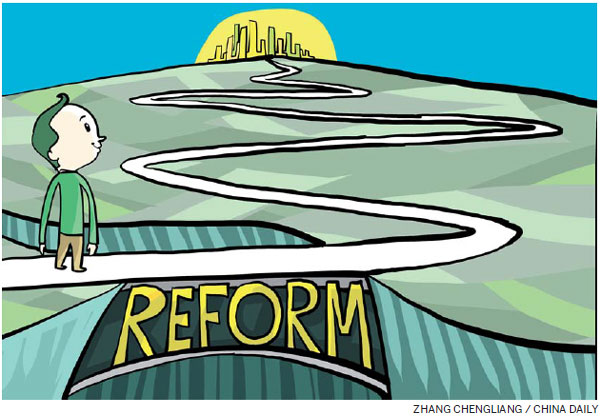Deepening reform to curb vested interests

Plunderbund, what a great word, it brings to mind images of pirates swashbuckling their way ashore to take whatever they can-although that might be just me; too much popcorn escapism and a love of the sea.
The word does refer to scurrilous thieves, though, only the real deal rather than Disney's celluloid heroes, since the definition of plunderbund is a "league of commercial, political or financial interests that exploits the public".
Such leagues of thieves steal a lot, and do so to the same end and with the same wish as those who steal a little. And by handing out bounties and benefits to their accomplices and facilitators, their malign influence spreads as a cancer of complicity.
This, of course, is not something unique to China. The sub-prime crisis in the United States that sparked the global financial meltdown, the consequences of which we are all still mired in, was fundamentally the result of commercial, political and financial interests exploiting the public.
However, China's leadership is demonstrating its resolve to fight those in the country who abuse their power and privilege, since it is fully aware that such actions perpetuate and exacerbate the imbalance between the rich and poor that is the fatal ailment for any republic.
Hence, the unprecedented anti-corruption campaign and the move toward greater social responsibility being defined by law, which has resulted in growing expectations that governance in the country will be "efficient and observe the law, while being free of corruption", as core leader Xi Jinping has stressed it should be.
And with this has come the anticipation that the government will uphold its responsibility for the well-being of those without money and connections.
This by its very nature entails a future loss for such plunderbunds. Hence, the obdurate resistance to reforms, which the country's leadership admits has been greater than anticipated.
While the anti-corruption drive, the longest and most systematic in Chinese history, has changed the way public officials do business, the real battle the leadership is engaged in is abolishing previously established privileges and trading monopolies.
It is a fight that is proving a lot harder, but one that the leadership has shown-most recently at the Sixth Plenum of the 18th Central Committee of the Communist Party of China-it is resolved to win.
To remove the cancer of complicity and overcome the resistance of vested interests to the deep-water reforms that will "invigorate the economy, promote social justice, and give ordinary people a greater sense of gain", constant pressure is being applied through the persistent anti-corruption campaign and the steady drip of reforms.
Hundreds of reform measures have been drawn up during the course of the 30 meetings of the Central Leading Group for Deepening Overall Reform since it was introduced in December 2013.
As Xi has emphasized on many occasions when stressing the need to continue with reform and establish the rule of law, these are the key to China's future.
For the trouble with plunderbunds is even when they have enough, usually more than enough, still they yearn for more, which as Xi cautioned way back in 2008, presages disaster.
"The biggest sin results from insatiability and the biggest disaster originates from endless desires," he warned, quoting the words of the Spring and Autumn Period (770-476 BC) philosopher Laotzu.
The author is a senior editor with China Daily.






















